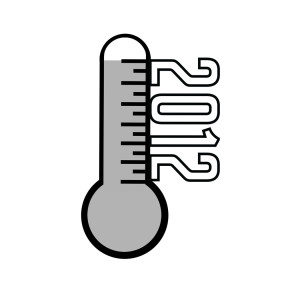 The data confirms what any citizen of the continental United States realized by stepping out of the range of an air conditioner: 2012 was officially the hottest year on record for the country. The average temperature of all four seasons of the past year was 55.3 degrees Fahrenheit, with over 34,000 daily high records set at weather stations across the country, according to the National Oceanic and Atmospheric Administration. This year’s average temperature beat the previous record holder, 1998, by one full degree. That is a significant variation, as only another 4.2 degrees separate the hottest and coldest recorded years. The United States witnessed several extreme weather phenomena in 2012, from a drought that covered 61 percent of the country at its peak and spurred record-breaking wildfires in Colorado and New Mexico to a “Frankenstorm” that devastated the North East in late October. At least 11 disasters have individually caused losses at the $1 billion threshold, according to the National Climatic Data Center.
The data confirms what any citizen of the continental United States realized by stepping out of the range of an air conditioner: 2012 was officially the hottest year on record for the country. The average temperature of all four seasons of the past year was 55.3 degrees Fahrenheit, with over 34,000 daily high records set at weather stations across the country, according to the National Oceanic and Atmospheric Administration. This year’s average temperature beat the previous record holder, 1998, by one full degree. That is a significant variation, as only another 4.2 degrees separate the hottest and coldest recorded years. The United States witnessed several extreme weather phenomena in 2012, from a drought that covered 61 percent of the country at its peak and spurred record-breaking wildfires in Colorado and New Mexico to a “Frankenstorm” that devastated the North East in late October. At least 11 disasters have individually caused losses at the $1 billion threshold, according to the National Climatic Data Center.
“By heating up the planet, you allow more water to evaporate in the air,” environmental science teacher Wesley Kirpach said. “More water and more heat in the air means bigger storms and larger weather systems. It’s not that super-storms haven’t happened before. We’ve seen it with Hurricane Katrina, for one example.”
Climatologists agree that the effects of climate change almost certainly played a role in exacerbating the year’s La Niña weather pattern, which typically causes drier weather.
“We know that Earth goes through these natural cycles, and we know it’s always heating and cooling,” environmental science teacher Julia Drake said. “I personally believe that humans are impacting global warming, and I also believe we’re going through a natural cycle—we’re still coming out of an ice age from several thousand years ago, and the only way to come out of that is to heat up.”
The pattern of extreme weather is not confined to the United States, and it has spilled over into the new year as well. Rare snowstorms blew across the Middle East on Jan. 10, causing flooding in some areas. Wildfires raged in Australia, where it was so hot that at one point gasoline was evaporating at the pump. China and Russia are in the middle of their coldest winters, and temperatures have struck 50 degrees below zero. Globally, the past year has been the 10th warmest since data was first collected in 1880. It was also the warmest year during a La Niña weather cycle.
“When you look at the scale of temperature change, the speed at which it’s happening is entirely too fast,” Kirpach said. “Consider that a barrel of oil has 42 gallons in it. Multiply that by the 18 million barrels we use per day in the United States, and that’s how much carbon we’re releasing in to the atmosphere.”
Such greenhouse gas emissions, largely considered the impetus behind a warming planet, reached the 50 gigaton carbon equivalent in 2012, according to a report from the United Nations Environment Program. Little was accomplished during the 18th UN Climate Summit in Doha last December, as delegates did not agree to specific standards or actions to curb carbon emissions.
“I was disappointed by the lack of results, but at the same time, it’s challenging to curb emissions,” Drake said. “Do you stop the undergoing development of countries like China and India right now by denying them fossil fuels? In the United States, do we tax fossil fuels? We just had a huge fight about taxes, and look at how that went.”
As the planet gets progressively warmer and energy policies remain largely unchanged, it seems that extreme weather is quickly becoming the new normal.
“Two hundred and fifty years ago, we used whales to light our lamps and heat our homes,” Kirpach said. “We started to run out of these resources, and we needed an alternative. Fossil fuels were it. Now that we’re going through those easily accessible fossil fuels, we’re left only with alternative energy sources. If we don’t switch to these readily available renewable resources, we will find ourselves in a predicament.”









